Filter by

Black Holes: Thermodynamics, Information, and Firewalls
This book reflects the resurgence of interest in the quantum properties of black holes, culminating most recently in controversial discussions about firewalls. On the thermodynamic side, it describes how new developments allowed the inclusion of pressure/volume terms in the first law, leading to a new understanding of black holes as chemical systems, experiencing novel phenomena such as triple …
- Edition
- -
- ISBN/ISSN
- 978-3-319-14496-2
- Collation
- -
- Series Title
- -
- Call Number
- 523.1

Sustainable Development Report 2020: The Sustainable Development Goals and Co…
Seperti tahun-tahun sebelumnya, dasbor dan profil negara untuk negara-negara OECD (Organisasi Kerja Sama dan Pembangunan Ekonomi) menyertakan metrik tambahan yang tidak tersedia untuk negara-negara non-anggota OECD.Dasbor tren SDG menunjukkan apakah suatu negara berada di jalur yang tepat untuk mencapai tujuan tertentu pada tahun 2030, berdasarkan kinerjanya baru-baru ini pada indikator yang di…
- Edition
- -
- ISBN/ISSN
- 9781108992411
- Collation
- -
- Series Title
- -
- Call Number
- T 338.9 SAC s c.1
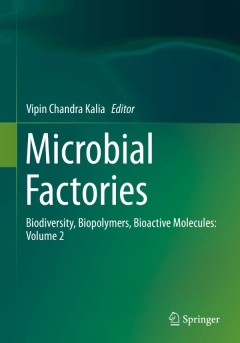
Microbial Factories
Dr. Vipin Chandra Kalia is presently working as Chief Scientist at Microbial Biotechnology and Genomics, CSIR-Institute of Genomics and Integrative Biology, Delhi. He is a Professor of Academy of Scientific and Innovative Research (AcSIR), Delhi. He obtained his M.Sc. and Ph.D. degrees in Genetics from the Indian Agricultural Research Institute, New Delhi. He has been elected as: (1) Fellow of …
- Edition
- 1
- ISBN/ISSN
- 978-81-322-2594-2
- Collation
- XI, 355
- Series Title
- -
- Call Number
- -
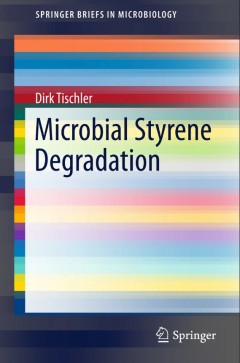
Microbial Styrene Degradation
This book describes the complex processes involved in styrene degradation by microbes, including highly adaptive microorganisms, the various enzymes involved in styrene biodegradation, new styrene-catabolic routes, novel regulatory mechanisms, and the genes coding for styrene metabolizing enzymes. Numerous biotechnological applications are discussed, such as the development of sustainable eco-f…
- Edition
- 1
- ISBN/ISSN
- 978-3-319-24860-8
- Collation
- XIV, 108
- Series Title
- SpringerBriefs in Microbiology
- Call Number
- -
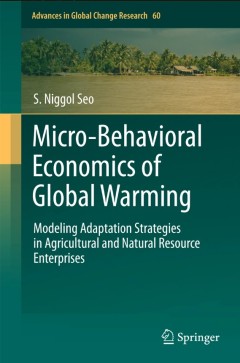
Micro-Behavioral Economics of Global Warming
This book presents a foundation for studying the micro-behavioral economics of global warming. The author develops an empirical model, named the Geographically-scaled Micro econometric model of Adapting Portfolios (G-MAP) in response to climatic changes and risks. The G-MAP model is applied to observed decisions of agricultural and natural resource enterprises in Sub-Saharan Africa and South Am…
- Edition
- 1
- ISBN/ISSN
- 978-3-319-15945-4
- Collation
- IX, 102
- Series Title
- Advances in Global Change Research
- Call Number
- -
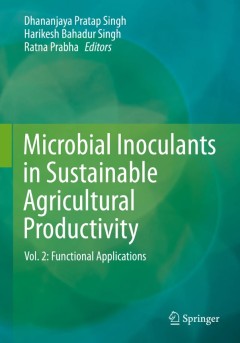
Microbial Inoculants in Sustainable Agricultural Productivity
The performance of crops in the soil largely depends on the physico-chemical components of the soil, which regulate the availability of nutrients as well as abiotic and biotic stresses. Microbes are the integral component of any agricultural soil, playing a vital role in regulating the bioavailability of nutrients, the tolerance to abiotic and biotic stresses and management of seed-borneand soi…
- Edition
- 1
- ISBN/ISSN
- 978-81-322-2642-0
- Collation
- XVI, 308
- Series Title
- -
- Call Number
- -

Microbial Inoculants in Sustainable Agricultural Productivity
The performance of crops in the soil largely depends on the physico-chemical components of the soil, which regulate the availability of nutrients as well as abiotic and biotic stresses. Microbes are the integral component of any agricultural soil, playing a vital role in regulating the bioavailability of nutrients, the tolerance to abiotic and biotic stresses and management of seed-borneand soi…
- Edition
- -
- ISBN/ISSN
- 978-81-322-2642-0
- Collation
- Number of Pages XVI, 308
- Series Title
- -
- Call Number
- -

Microbial Inoculants in Sustainable Agricultural Productivity
How to achieve sustainable agricultural production without compromising environmental quality, agro-ecosystem function and biodiversity is a serious consideration in current agricultural practices. Farming systems’ growing dependency on chemical inputs (fertilizers, pesticides, nutrients etc.) poses serious threats with regard to crop productivity, soil fertility, the nutritional value of far…
- Edition
- 1
- ISBN/ISSN
- 978-81-322-2645-1
- Collation
- XVIII, 343
- Series Title
- -
- Call Number
- -
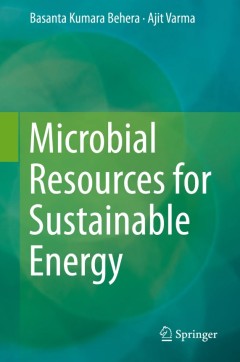
Microbial Resources for Sustainable Energy
This book sheds new light on how microbes can be used as effective and sustainable resources to produce green energy in the form of biogas, algal diesel, ethanol, hydrogen and direct electricity. It discusses topics such as microbial energy conversion technologies, including ethanol production by microbial catalytic reaction, biomethanization, biodiesel from microalgae, microbial fuel cells, an…
- Edition
- 1
- ISBN/ISSN
- 978-3-319-33776-0
- Collation
- XIX, 280
- Series Title
- -
- Call Number
- -
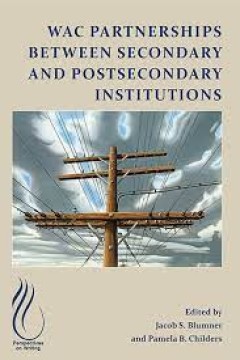
WAC Partnerships Between Secondary and Postsecondary Institutions
Working with educators at all academic levels involved in WAC partnerships, the authors and editors of this collection demonstrate successful models of collaboration between schools and institutions so others can emulate and promote this type of collaboration. The chapters in this collection describe and reflect on collaborative partnerships among middle schools, high schools, colleges, and uni…
- Edition
- -
- ISBN/ISSN
- 978-1-64215-073-5
- Collation
- -
- Series Title
- -
- Call Number
- 808.042 071 2 WAC
 Computer Science, Information & General Works
Computer Science, Information & General Works  Philosophy & Psychology
Philosophy & Psychology  Religion
Religion  Social Sciences
Social Sciences  Language
Language  Pure Science
Pure Science  Applied Sciences
Applied Sciences  Art & Recreation
Art & Recreation  Literature
Literature  History & Geography
History & Geography